Creatine burst onto the sports supplement market shortly after the 1992 Olympics. A handful of athletes claimed that using creatine helped them hurdle and sprint faster than ever before.
Since then, people of various athletic abilities have used creatine monohydrate to increase their muscle mass and improve their athletic performance successfully.
But is it really that easy? Can you take a supplement and your muscles will get bigger, stronger, and more pronounced? Are there any downsides that go along with taking creatine?
Let’s take a closer look at this popular product. We’ll examine what it is, what it isn’t, and how it works. We’ll also talk about why people might take creatine even though they’re not athletes.
What is Creatine?
Creatine is a naturally produced compound in the body. It is composed of carbon, hydrogen, nitrogen, and oxygen atoms. Our bodies use creatine in the production of energy, especially when we perform any activity that uses quick bursts of strength or speed.
The average person has between 120 and 160 grams of creatine stored in their muscles. Trace amounts of creatine are also found in our brain, liver, kidneys, and testes.
A creatine supplement can help certain people, such as:
- Athletes who train at very high intensities,
- Athletes who need quick bursts of energy such as sprinters or hockey players,
- Vegetarians or vegans who miss out on the creatine found in meat and eggs,
- Elderly folks who are naturally losing muscle,
- Individuals with certain medical conditions.
For now, you need to know that creatine is used by our bodies to produce energy. Energy molecules in the body are stored as ATP. Creatine is stored mainly in our muscles because that’s where the energy reactions take place.
What is Creatine used for?
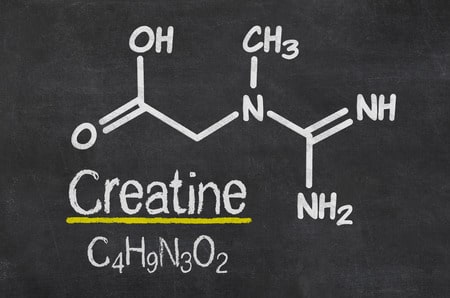
We just talked about how creatine is used by our bodies to produce energy, but it’s a particular kind of energy. You don’t use a lot of creatine when you’re sitting around or sleeping, but you will use small amounts.
Creatine is used to produce energy when the body is under stress. Aside from mental stress, this includes intense exercise such as sprints or explosive, heavy weight-lifting exercises like Olympic lifts.
Your body doesn’t use the same energy pathways during activities such as long-distance running where your heart rate remains in the low to moderate range. Low to moderate-intensity exercise relies on energy systems that use oxygen, not ATP. This ATP pathway for high-intensity training is called an anaerobic energy system because it doesn’t use oxygen.
Stress can also include lack of sleep, too much or too little food, dehydration, and inadequate nutrition. All these things require extra energy from our bodies.
At the cellular level, this is how energy is made: the body breaks down ATP into ADP (adenosine triphosphate to adenosine diphosphate).
Along with ATP changing to ADP, this chemical reaction also produces a lone phosphate ion (Pi) and a unit of energy. The body will immediately use that unit of energy.
Then, in a reverse chemical reaction, it will take the ADP molecule along with a Phosphocreatine (PCr) molecule to reform ATP. The body can’t use ADP for energy, only ATP.
This energy cycle of breaking down ATP to ADP and reforming ADP into ATP with PCr will happen multiple times. Once PCr (phosphocreatine) runs out, after 5 to 10 seconds of super-intense exercise, the body can no longer rely on this energy system.
At this point, you would need to slow down or lower the weight. Your body will be screaming for oxygen as it automatically kicks into the anaerobic energy system.
Is Creatine Safe?
Creatine is one of the most researched sports supplements on the market. Although creatine was first discovered in 1832 by a French chemist, it wasn’t commonly used as a supplement until over 100 years later.
Athletes tinkered around with Creatine in the 1900s, but creatine only made headlines in the 1990s. Three athletes who medalled in the 1992 Barcelona Olympics credited their explosive performances to creatine.
Since then and even before 1992, hundreds of studies on creatine have been conducted. Scientists have discovered who might benefit from creatine supplements and who should avoid it.
At the same time, they’ve discovered the safest dosage of creatine. There is such a thing as taking too much creatine.
We also know that people with kidney problems should not take creatine. Individuals with diabetes should consult with their doctor before consuming creatine.
At this point, the research suggests that creatine appears to be safe for long term use, but there remains controversy around this popular sports supplement.
Uses & Benefits of Creatine
1) Athletic performance
Creatine is one of the most – and perhaps the most – popular sports supplement used by athletes today.
Creatine helps athletes improve their performance because it increases the amount of ATP that can be produced. This means that an athlete can handle a more significant workload, in terms of both weight and time.
Creatine also draws more water into the muscle cells, thereby reducing the risk of dehydration and cramping. Additional water is also suitable for muscle repair and growth.
Scientists have found that creatine helps improve signaling between cells. This can contribute to increased speed and strength performances.
Lastly, related to workload, creatine can help an athlete train at high intensities for more extended periods. Typically, creatine is used most in the body during the first 5 to 10 seconds of an explosive movement.
With more creatine stored in the muscle, this period of extremely high intensity might increase to 10 to 15 seconds, enough to make the difference between first place and last place.
2) Increased body mass

When a person begins to supplement with creatine, they often notice an increase in weight. This is not actual mass gain but usually an increase in water. Water “retention” can be explained by the chemical reaction of recycling ATP and ADP that creatine is involved in.
When creatine acts by pulling water into muscle cells, the cells swell. They will remain swollen with water as long as an excess of creatine is in the body.
More water in the cells can be a good thing – some research claims that it stimulates the muscle cells to grow. We know that water is also a conductor of electricity. This contributes to the idea of improved communication between cells.
However, this water weight gain for some athletes is not beneficial. Depending on the sport, they may not want any extra water and/or weight. It can slow them down and decrease mobility.
Another way that creatine can contribute to an increase in muscle growth is through the additional workload that results from higher energy production.
Remember that having more creatine stored in muscles helps maintain the ATP-ADP cycle for longer than the normal 5 to 10 seconds. This means that an athlete can train at a higher intensity with regards to both weight and time.
This higher workload will translate to an increase in muscle mass over time. If you train regularly, this growth is almost always faster with creatine than without.
Lastly, creatine aids in muscle growth by suppressing myostatin and increasing IGF-1. Their genes directly impact levels of myostatin in a person’s body.
Higher levels of myostatin are associated with low muscle mass, while low levels are associated with higher muscle mass. Creatine suppresses myostatin, allowing more muscle growth to occur.
IGF-1 is an anabolic protein-hormone that is also tied to an individual’s genetics. If your body tends to have higher levels of IGF-1, research has shown that you will typically have more muscle than someone with lower levels of IGF-1. Creatine appears to raise IGF-1 levels within the body.
3) Preventing muscle damage and enhancing the recovery process
Creatine has also been proven to help in recovery following intense workouts. It also appears to help injured athletes recover within a shorter period.
Muscle requires amino acids, the smallest part of a protein, to rebuild and repair itself. Creatine is made up of three amino acids: methionine, glycine, and arginine. The more creatine that is stored in your muscle, the more amino acids are at your bodies disposable.
And the faster your body can access these amino acids for repair after your muscles are torn down during a training session, the sooner you’ll be ready to hit the gym hard again.
4) Depression
One of the lesser-known positive side effects of creatine supplementation is its ability to help people suffering from depression. Numerous studies have been conducted that show a significant change for the better when patients with depression add a low dose of creatine to their medication.
However, individuals who have bipolar disorder do not experience a positive outcome. Patients with bipolar would be wise to steer clear of creatine supplements.
If you suffer from depression, contact your doctor and ask him/her if a creatine supplement would be right for you.

5) Cognitive ability
Creatine supplements increase the amount of creatine in the brain, but why does this matter? Even without adding in exercise, people with medical conditions who suffer from cognitive impairment due to any number of factors including lack of sleep, often experience positive results from creatine.
Research suggests that muscle and brain cells operate better with the addition of creatine. Exactly what mechanisms are at work is not entirely clear, and the results are not always consistent.
However, knowing that creatine is a well-researched supplement, it is usually considered to be safe to try it to see if it works for you. See your doctor before supplementing with creatine.
6) Vegans and Vegetarians
Our body manufactures creatine from amino acids, but we also ingest creatine from red meat, eggs, and fish. Individuals who avoid eating meat are often at risk for creatine deficiency.
This often results in lower muscle mass, more fatigue, and more mediocre performance and quality of life than someone who regularly eats meat.
In the case of a vegetarian or vegan athlete, a creatine supplement is especially helpful. Studies have shown the positive effect the addition of creatine has in helping these athletes improve in their training and recovery.
Fortunately, creatine is not made with any animal products and is safe for vegetarians and vegans alike.
7) Neurological conditions
There are over 600 neurological conditions that affect the brain, spinal cord, and nervous system. Adding creatine to the diet of those affected by neurological conditions, including those recovering from traumatic brain injury, shows positive outcomes.
Researchers believe that an impairment in the ATP-ADP energy cycle can contribute to neurodegenerative diseases. With the addition of creatine to a patient’s diet, their progression may stop. Some patients even show signs of improving.
However, more studies need to be conducted on the effects of creatine on neurological conditions before any concrete claims can be made.
Creatine dosage instructions
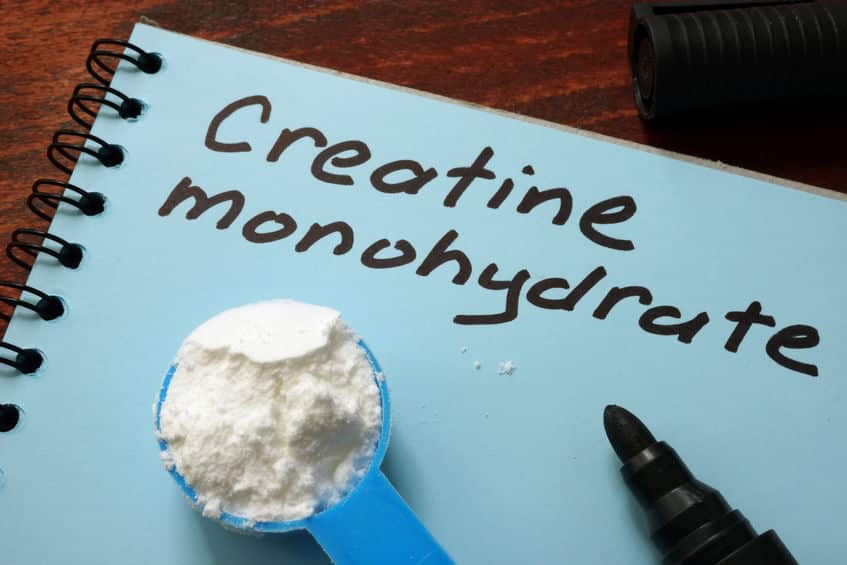
When a person initially begins taking a creatine supplement, it is often recommended to start with a “creatine loading” period of 5 to 7 days. In this instance, a person would take 20 grams of creatine a day, split into four servings throughout the day.
However, since the average human only uses 1 to 2 grams of creatine a day, loading is usually unnecessary. Most individuals can begin by supplementing with 3 to 5 grams of creatine a day.
Results may be slower without a loading period, but you’ll see why we recommend you skip this initial step next.
Side effects of Creatine
Current research has shown a mixed review of the negative side effects of taking creatine. While some people seem to feel the effects of taking creatine, others don’t notice any side effects.
One possible cause of unwanted side effects may be that the individual is taking more than the maintenance dose of 3 to 5 grams. If someone is taking up to 20 grams of creatine a day, they may be more likely to suffer from unpleasant symptoms.
Taking too much creatine can cause side effects, such as:
- Stomach pain,
- Nausea,
- Muscle cramping, and
- Diarrhea.
If large doses are avoided, negative side effects will likely be minimal.
Taking creatine for an extended period has so far not been thoroughly documented. The main concern for prolonged creatine use would be kidney damage. Speak with your doctor before taking any supplements for any period.
Should I use Creatine supplements?

Approximately 30% of users who have used creatine supplements have noticed no noticeable change in their bodies. These people are referred to as creatine “non-responders.” If you’re one of the 30%, there is no reason to spend money on a supplement that doesn’t work for you. Nor does it make sense to ingest something that you can’t benefit from.
As mentioned before, there is a small segment of the population who should avoid taking creatine at all costs. These include:
- Individuals with kidney or liver disease,
- Those at risk of developing kidney or liver disease,
- Diabetics (may be able to use with caution, see your doctor).
Creatine may also interact with certain medications. If you are taking any prescription medications, speak with your doctor about taking creatine before you use the supplement.
Also, speak with a doctor before taking creatine during pregnancy or while breastfeeding.
Athletes who engage in these sports are most likely to benefit from supplementing with creatine:
- Hockey players,
- Sprinters, hurdlers, and jumpers,
- Weight lifters,
- Any sport or training method that requires you to work in short bursts of intense exercise.
And lastly, people who suffer from these conditions may also benefit from taking creatine:
- Alzheimer’s disease,
- Parkinson’s disease,
- Huntington’s disease,
- Ischemic stroke patients,
- Epilepsy,
- Brain or spinal cord injuries,
- Motorneuron disease,
- And the elderly who suffer from memory and/or brain function.
Studies have shown that people who suffer from muscular or neurodegenerative diseases often show improvement when taking daily doses of creatine.
FAQs
Does Creatine affect you sexually?
While some men notice no differences in their sexual drive or performance, there are a small handful of reports from men who experienced a drop in the drive along with softer erections.
As far as creatine’s effect on testosterone, the research is still unclear as to whether there is a connection.
For now, we can surmise that most individuals will not experience any changes in sexual drive or performance when taking creatine. Individual results may vary.
Is Creatine good for anxiety?
Creatine does show promise for individuals who suffer from anxiety.
Along with studying what effects creatine has on patients with anxiety and other mental health issues, researchers found that many anxiety sufferers have lower levels of creatine in their body.
Studies have shown that creatine can indeed help support and possibly repair fault brain function, thereby reducing anxiety.
Is Creatine a steroid?
No, creatine is not a steroid. Creatine occurs naturally in the body whether or not we supplement with it.
Creatine has been associated with similar anabolic steroid effects such as muscle growth, but it operates differently.
Creatine helps muscle cells produce more energy to enable them to work harder for longer periods, thereby contributing to muscle growth.
Steroids are illegal and dangerous. Creatine is considered safe and is legal.
Can Creatine increase testosterone levels?
The research on creatine and testosterone levels is mixed. Some studies have shown minimal increases in testosterone levels following creatine use. Other studies show no significant changes.
Dihydrotestosterone (DHT), a hormone that contributes to the production of testosterone and associated with hair loss, showed a more significant increase with creatine use than testosterone
Is Creatine necessary for muscle growth?

Creatine is already naturally found in the body. It plays an essential role in the creation of energy. Creatine as a supplement is not necessary for muscle growth, but it can help.
An individual who wants to increase their muscle mass will likely see positive results by having a regular weight lifting routine, minimize long cardio workouts, getting plenty of sleep, and eating a well balanced, nutritious diet with protein.
Can Creatine cause hair loss?
Higher amounts of creatine have been associated with hair loss. Creatine has a positive effect on DHT, a testosterone-related hormone that is associated with baldness.
To avoid hair loss as a side effect, stick with taking the lowest dose possible of creatine, and monitor your results.
The bottom line
Taking creatine can be an attractive solution for a person looking to add muscle to their frame. Creatine is relatively cheap, and it’s a prevalent supplement. You’ll find many pros and amateur athletes and weightlifters who claim that creatine gives them an edge during training and/or performing.
Most of the research says that creatine is safe, but much of the research does not look at long term use, that is, creatine use beyond five years.
If you’re considering adding creatine as a supplement, we suggest that you first establish this routine:
- eat a well balanced, nutritious diet with plenty of protein;
- stick to a regular weightlifting routine, one that progressively challenges you;
- get enough sleep and rest days;
- limit alcohol and long bouts of cardio.
If you’ve done all these things for several months and you still can’t achieve the muscle mass you’d like, see your doctor before taking creatine or any other sports supplement.
Used the right way, creatine can have a positive effect on gaining muscle, strength, and power. Just make sure you’re doing it the right way.
References:
- https://www.ncbi.nlm.nih.gov/pubmed/18652079
- https://www.ncbi.nlm.nih.gov/pubmed/28577542
- https://www.scq.ubc.ca/an-introduction-to-creatine/
- https://sci-fit.net/creatine-research-study-collection/
- https://www.ncbi.nlm.nih.gov/pmc/articles/PMC3963244/
- https://examine.com/nutrition/creatine-testosterone/
- https://examine.com/nutrition/does-creatine-cause-hairloss/


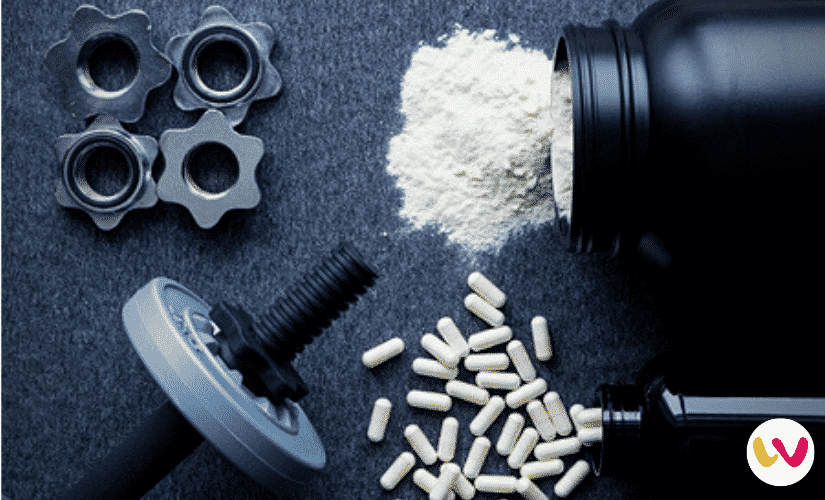
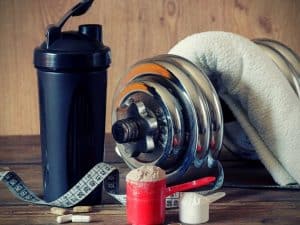
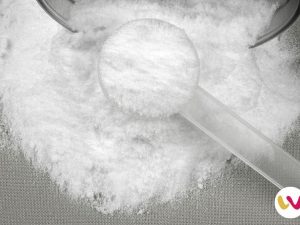

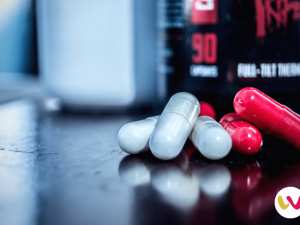

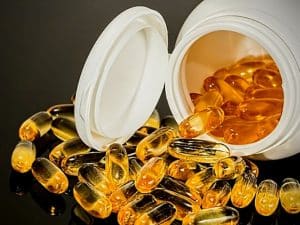
Add Comment